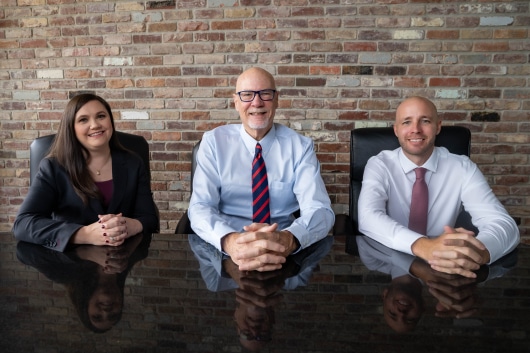Getting hurt in an accident is a frightening experience no matter what. But when that injury robs you of your ability to work, your entire financial security and wellbeing is at risk. The good news is that you may be entitled to Social Security Disability benefits to ease your hardships after an injury.
Many times, accident victims are unsure if they qualify for disability or how to proceed with a claim. The majority of applicants receive denials on their first try. Don’t worry, and don’t give up. At Brooks Law Group, an experienced Florida Social Security Disability Insurance attorney can guide you through the entire disability process. Whether you’re applying for the first time or seeking to appeal, our lawyers can help you pursue the benefits you deserve.
Call or contact us for a free consultation today.
What is Social Security Disability Insurance?
Social Security Disability Insurance (SSDI) provides income assistance to people who have suffered an injury that prevents them from working. Qualified individuals can receive temporary disability while they recover from serious injuries, or they can be classified as permanently disabled and receive income support until they reach age 65. At that point, disability benefits would change to regular Social Security retirement benefits instead.
Social Security Disability pays you a regular income, though the amount changes annually. Unlike most insurance benefits, disability benefits are not based on your actual previous income or your net worth. Instead, they are based on average income estimates for your area.
Examples of Personal Injuries
A personal injury is any physical or emotional harm that you suffered in an accident. Some of the most common personal injuries that might qualify someone for SSDI stem from:
- Car accidents
- Truck accidents
- Motorcycle accidents
- Bicycle accidents
- Pedestrian accidents
- Slip and fall
If you sustained any sort of accidental injury that has left you disabled, you should investigate whether disability benefits are a possibility for you. A knowledgeable attorney at Brooks Law Group can assist you throughout the process.
Am I Entitled to Disability After a Personal Injury?
You may be entitled to disability benefits if you:
- Are over the age of 18
- Have a condition that is expected to last for at least a year (12 months) or to affect you for the rest of your life
- Have been diagnosed with a physical or mental injury that prevents you from engaging in any form of substantial gainful employment
- Have accumulated 20 Social Security credits from jobs that paid into the Social Security system. Typically, an individual accumulates a credit for every $1,450 they earn, up to a maximum of four credits per year. In general, that means you must have worked for five to eight years before qualifying for disability.
- Have not been denied disability within the last 60 days
What Does The Social Security Administration Require?
The primary piece of evidence establishing that you qualify for disability is the testimony of the doctor(s) who have been treating you and your medical records. The Social Security Administration also often requires an independent doctor (who doesn’t know you) to examine you and determine the extent of your physical and/or mental disability.
A common challenge that SSDI applicants encounter is proving that they are incapable of engaging in any form of substantial paid employment. For example, someone who was trained in a job that requires a lot of hard physical labor and then loses the use of one leg clearly cannot resume working in their previous occupation. However, after re-training, he or she could possibly work a desk job. On those grounds, a denial would be likely.
The determination of whether the individual is unable to work is made on the basis of the person’s residual functional capacity (RFC.) A disability examiner will use the evidence provided on the RFC form to determine what activities you can (and can’t) do as a result of your disability.
Then, the examiner creates a “vocational grid” where your RFC, previous job, level of education, skills, experience, age, and ability to successfully complete job re-training are all considered together.
Factors that are considered include:
- Ability to walk
- Ability to use your arms and hands effectively
- Level of chronic pain
- Mental state
It is not uncommon for individuals who are involved in severe, life-threatening accidents to develop disabling post-traumatic stress disorder (PTSD). If your doctor and lawyer can establish that you are unable to work due to your accident-related PTSD or a traumatic brain injury (TBI), you may still qualify for disability even if you recover from your injuries.
How to File a SSDI Disability Claim after an Accident
 You can apply for disability using an online form, in person, or at your local Social Security office. The Social Security Administration hands out Disability Starter Kits that provide information about the process to help you prepare to fill out the online form or manage the phone interview. It also outlines what kind of information you will need to collect to supplement your application.
You can apply for disability using an online form, in person, or at your local Social Security office. The Social Security Administration hands out Disability Starter Kits that provide information about the process to help you prepare to fill out the online form or manage the phone interview. It also outlines what kind of information you will need to collect to supplement your application.
However, Brooks Law Group strongly recommends that you do not apply for SSDI benefits without consulting a skilled disability attorney first. There are many ways that a claim can get hung up during the application process. A lawyer can help you prepare a complete application with the evidence necessary to prove why you qualify for disability benefits.
What If My Injury is Not Listed in the Blue Book?
The Social Security Administration maintains a list of injuries and conditions that generally qualify an individual for disability. This is commonly called the Blue Book. The general category of injuries is usually quite short. For example, for musculoskeletal injuries, the list says:
- Major dysfunction of one or more joints
- Reconstructive surgery of a major weight-bearing joint
- Spine disorders
- Amputation
- Fractures of the bones in the pelvis, legs, feet, or the arms/hands
- Burns or other severe soft tissue injuries
Qualifying Injuries
However, clicking on any of the conditions takes you to a more specific list of qualifying injuries. For example, you don’t qualify for disability if only one of your hands is amputated in an auto accident. But if you also have an amputation performed on one of your lower limbs, Social Security Disability benefits are possible.
While these lists of injuries may seem restrictive, there are general rules about residual functioning capacity that can count towards your ability to qualify.
For example, the general rules about RFC for the musculoskeletal system tend to revolve around the ability to move effectively. If you can’t walk from your home to a mode of transportation to your workplace, you can’t move effectively. If you can only get around with assistance from another person or by using handheld assistive devices (e.g., a walker or two canes) that limit your ability to use your hands while walking, you may qualify for disability, regardless of whether your injury is listed or not.
The other aspect that is examined regarded musculoskeletal injuries concerns the ability to perform fine and gross motor movements with the arms and hands. It is very difficult to find employment if you can’t use a computer, a cash register, or a touch screen due to injuries that impair your ability to use your hands and arms effectively.
Keep in mind that every situation is unique. For that reason, it’s wise to consult with an experienced Tampa disability lawyer before trying to interpret the Blue Book on your own.
When to Contact a Social Security Disability Attorney
Two-thirds of disability claims are denied on initial review, according to the National Organization of Social Security Claimants’ Representatives. However, applicants improve their chances with the help of a knowledgeable attorney. Around 90 percent of applicants bring a disability lawyer to their appeal hearings after initially being denied benefits.
The Social Security Administration estimates that it takes about three months to complete each primary application for disability. If the initial application is denied and appealed, it may take over a year before a final decision is reached. Due to the lengthy timeline, it’s very important to have your application filed properly the first time. At Brooks Law Group, we know what it takes to craft a solid, evidence-based claim for disability benefits. We’ll do everything in our power to submit a strong disability claim that gets you the income that you are entitled to as quickly as possible.














